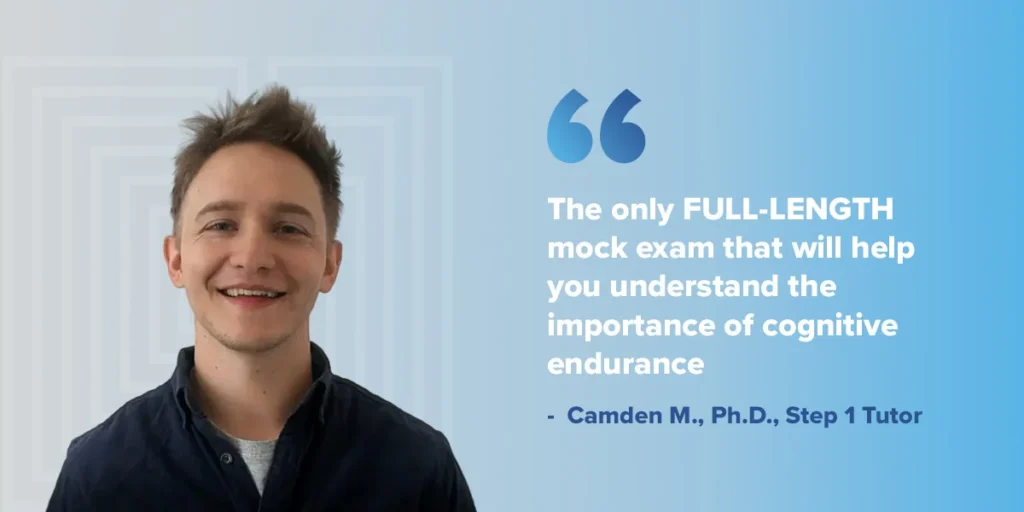If your Step 1 exam is scheduled in 2026, you may be wondering whether you need to be following conventional advice about Step 1 dedicated periods. Should you follow the detailed study calendars that abound online? Should you use the entire study period which your medical school has provided you? And most importantly: is it worth spending so much time preparing for this exam now that no numerical grade is given?
In this post we offer some do’s and don’ts about how to build your study strategy in 2026!

Get ready to pass with Blueprint’s Step 1 Practice Bundle, including TWO full-length mock exams for the price of one! That’s 560 total questions (each exam has 7 blocks of 40 questions) written and timed like the real boards. 🤩 Get started today!
Do: Have a concrete study plan going into dedicated.
In the days and weeks leading up to the start of your dedicated, take some time to create a detailed study schedule. Without a written list of your daily tasks, it can be easy to fall behind on milestones for questions completed and content reviewed. By having a concrete plan, you can make sure you’re meeting your goals.
One pro tip: be sure to schedule in flex days. As you can imagine, life continues even during dedicated and it can help to create time for catching up on work! I also recommend adding in one practice exam a week and time for review it.
🪄 Create a personalized study schedule that tells you exactly what to study each day with Blueprint’s Med School Study Planner! Take the stress out of falling behind with the magical Rebalance button, which automatically redistributes your upcoming tasks with the click of a button.
Don’t: Try to use every resource in existence.
Studying for Step 1 can be overwhelming and it may feel comforting to have a lot of resources in your arsenal. Next thing you know, every couple hours you are juggling a new resource and can’t give each one the proper due diligence.
As with most things in life, quality over quantity applies again. Hone in on 3-4 key resources. For example, use the question bank of your preference to practice test-taking strategies and content review. Pair this with a textbook or video series along with flashcards for further content review. This will serve as a solid foundation. If you find yourself wanting more, add in another resource.
Do: Aim to be significantly above the passing threshold on your practice exams.
With Step 1 being pass/fail, it’s especially tempting to lower your guard. Still, full-length NBME practice tests are a necessary tool in this pass/fail Step 1 era! They serve as the best indicator for whether you will indeed pass the actual exam. You will have a better chance to pass if you recreate the exam environment while studying. That’s why it’s especially important to take each practice exam under testing conditions (with timed breaks and closed books).
Although the practice tests may leave you stressed and exhausted, by accurately replicating the real testing experience you will make sure it’s not as new and stressful when the time comes to take the actual Step 1. Test day requires you to be on your A-game for eight hours! By practicing ahead of time, you can prepare your stamina for this ultra marathon.
A major change in practice exams is that a score is no longer provided at the end, only a probability of passing. In conjunction with your academic advisors or Step 1 tutor, determine what threshold of passing is best for you. After some period of dedicated, it is common to reach a plateau where there are only slight variations in performance.
Aim to take the actual Step 1 exam only when your practice exam scores are consistently, comfortably above the passing threshold. If you have time, try to take as many practice tests as feasible. Keep in mind that they are also a high-yield way to gain medical knowledge, which will better prepare you for rotations, as well as for your entire medical career.
Don’t: Deviate too much from other well-established methods for success.
Although students may never again try to ramp up studying to increase from a 250 to a 260 during their final weeks of preparation, most aspects of Step 1 studying didn’t change when the exam went pass/fail.
You may be tempted to reduce the length of your dedicated study period or to follow a lighter schedule of studying. Remind yourself that passing Step 1 is a formidable goal by itself (and a wonderful accomplishment, once it’s achieved)!
This exam tests a broad knowledge base and you want to have a strong foundation, especially for future clinical exams. It’s best to follow the steps of those who came before you and to take advantage of the many study guides, calendars, and resources that were created when Step 1 was a graded exam.
Do: Use the test’s pass/fail grading to help lower your anxiety.
Although you will continue to study for this exam as hard as the previous students did when it was graded, you can alleviate some of your stress by reminding yourself that your actual score will not be recorded as long as you pass.
Use the new pass/fail scoring as motivation to feel more confident that you can master Step 1, as long as you stick with your efforts and continue to make progress!
Don’t: Focus on merely passing Step 1 for the purpose of this exam only.
Keep in mind that you are not merely passing Step 1 to move on to the next step of medical school. You are also passing Step 1 to prepare for your time on clinical rotations, where you’ll be directly involved with patient care.
All of your knowledge will come in handy when it’s time to present on patients, write progress notes, or interview patients to fill in a history of present illness. In order to learn as much as you can in hospitals and clinics, and to prepare to be the best physician possible, it is especially crucial to approach clinical experiences with a wide, comprehensive knowledge base.
Once preclinical, lecture-based courses are over, you will begin the lifelong learning that a career in medicine always involves. As a clinical medical student, resident, fellow, or attending physician, no one will be directly tracking how much you study or what multiple-choice questions you can answer correctly. Continuous learning is a personal responsibility (and privilege). And the earlier you start, the easier this path will be for you.
Do: Use the Step 1 experience to help guide your subsequent Step 2 experience.
Step 1 and Step 2 are unique in how they both involve weeks of dedicated studying, a few thousand practice questions, and a LARGE amount of content. Because of this, many students find that certain daily habits or study routines are useful additions to their typical patterns during Step studying periods.
During your Step 1 dedicated study time, try different approaches: concentrated studying blocks, an exercise routine, or the pomodoro technique (worth checking out even because of its name!). Sprinkle in breaks and fun activities. Figure out whether you like to take notes as you complete practice questions and how you can learn most effectively. You’ll thank yourself later when the time comes to start Step 2 study period!
Don’t: Try to cram in Step 2 studying right now.
Step 2 has an increasingly important role after Step 1 became pass/fail. Although the content of these two exams overlap, studying for Step 2 before taking Step 1 is not a great strategy. Step 1 is highly detailed and includes many subjects, ranging from biochemical reactions to immunological pathways and disease mechanisms. This is why you will likely need as much Step 1 studying time as you can get—and even then, still won’t think it’s enough.
Also, Step 1 and Step 2 assess fundamentally different aspects of medicine. The Step 2 exam emphasizes diagnostic reasoning and clinical management, whereas Step 1 emphasizes foundational content recall and is more detail-oriented. Because of this difference, the way to approach Step 2 practice questions is different from the way to approach Step 1 practice questions, and studying for both exams simultaneously may be counter productive.
Final Thoughts
While Step 1 becoming pass/fail has alleviated some of the stress of the exam, this is still an arduous experience. Nonetheless, with a good dedicated study plan in place, it is nothing that cannot be overcome!
One final tip that helped me was to study with the mindset that every fact I learned could help someone one day. I know that dedicated can become monotonous, but knowing that what I was learning was important in serving patients brought joy to it. Ok, maybe not the Krebs cycle, but most of the exam!
Also, dedicated is fortunately a finite time period. Once exam day is over, you can move on to the next step in your training. Best of luck as you embark on this journey!





